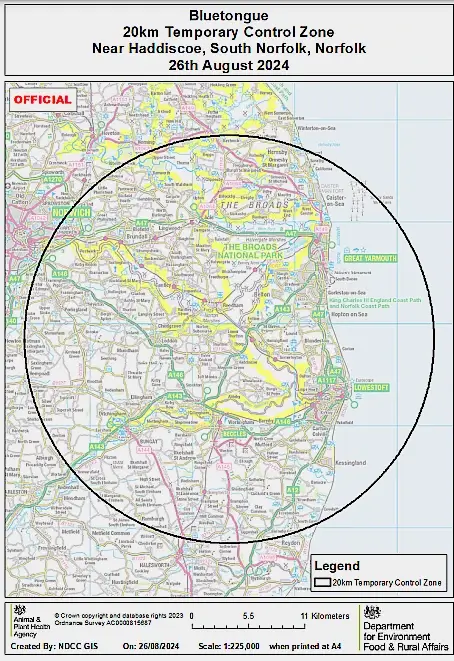In a stark reminder of the ongoing risks to livestock, the UK government has confirmed the first Bluetongue virus BTV3 case of the 2024/25 vector season in South Norfolk. Consequently, this detection has prompted swift and decisive action.
Specifically, the government has established a 20km temporary control zone (TCZ) around the affected farm in order to contain the spread of the disease. Moreover, this rapid response aims to prevent further outbreaks and protect the surrounding livestock population.
Introduction
The Bluetongue virus, primarily transmitted by midge bites, poses no threat to human health or food safety but can severely impact livestock. The disease affects cattle, sheep, goats, deer, and camelids such as llamas and alpacas, leading to a range of symptoms from mild to severe.
In some cases, infected animals may show no signs, while others may suffer productivity losses, including reduced milk yield, and, in extreme cases, fatalities.
Vigilance and Control Measures
The confirmed case in a single sheep near Haddiscoe has led to the immediate implementation of a TCZ, restricting the movement of susceptible animals and their germinal products within the 20km radius.
These restrictions are crucial in preventing the further spread of the virus, particularly given the current warm temperatures and increased midge activity, both of which heighten the risk of transmission.
UK Deputy Chief Veterinary Officer, Ele Brown, emphasized the importance of vigilance among farmers:
“Bluetongue does not pose a threat to human health or food safety, but the disease can impact livestock farms and cause productivity issues. This detection is a clear reminder of the threat of the disease: farmers and their vets must remain vigilant and report any suspicions to APHA.”
Farmers in the affected area are urged to monitor their animals closely for any clinical signs of the disease and to report any suspicions to the Animal and Plant Health Agency (APHA).
It is also essential for farmers to ensure their animals and land are registered with the APHA, enabling swift communication and easy location of livestock.

Temporary Control Zone (TCZ) Details |
|---|
| Radius: 20km around the affected farm |
| Restrictions: Movements of susceptible animals and germinal products are restricted. Licenses required for movement within the zone. |
| Monitoring: Ongoing surveillance to detect virus circulation. Farmers urged to remain vigilant and report any signs of disease. |
Implications and Ongoing Surveillance
With the Bluetongue virus already spreading in Northern Europe, the risk to the UK’s livestock industry is significant. The Chief Veterinary Officer has previously called for increased vigilance and responsible sourcing of livestock, urging farmers to avoid importing animals from high-risk areas without proper checks.
Surveillance is ongoing to determine whether the virus is actively circulating within the UK. Given the conditions conducive to the spread of Bluetongue, the authorities are on high alert to prevent any further outbreaks.
Food for Thought
The confirmation of Bluetongue virus in South Norfolk highlights the continuous threat posed by vector-borne diseases to the UK’s livestock.
As the government implements stringent control measures, the cooperation of the farming community is vital in safeguarding the health of the nation’s livestock and preventing further spread of the disease.
Sources: THX News & Department for Environment, Food & Rural Affairs & Animal and Plant Health Agency.









